
Trying to lose weight? Maybe lose 30 pounds in 3 months?
You are in the right place!
Quite often, it is confusing to understand the effective ways of losing weight in the shortest amount of time possible. This is because there are many myths and fads surrounding this topic.
The point that many people seem to miss with regard to weight loss is that it is not self-torture where you go on hunger diets that will exhaust you and deplete your vitality. It is merely forming new dietary habits that are healthy and at the same time, finding that unique blend of alternative food and lifestyle choices that are sustainable in your life as per your tastes.
Below is an extensive and highly effective list of techniques that can help you lose weight fast. They are all backed up by scientific research studies.
As a shortcut, you can also get a plan that will tailor-make a weight loss diet plan for you.
So here we go…
THE ULTIMATE TRICKS TO LOSE WEIGHT
-
Drink Lots of Water

The proverb goes that, “To a Thirsty man, a drop of water is worth more than a sack of gold”. But… is it the same for a person who is not so thirsty?
The answer is…. YES!!
Keeping yourself sufficiently hydrated throughout the day has many health benefits like skincare, weight loss, disease prevention, digestion, etc. and the list keeps growing.
Coming to weight loss, pre-loading yourself with about 500 ml of water 30 minutes before your meals will help you reduce your energy intake through food. Multiple studies have confirmed this.
A study48 (Davy et al., 2008) was conducted in the US among 24 obese older adults on energy intake at a breakfast meal. They drank 500 mL of water (17 ounces) 30 minutes before the meal. Meal energy intake was significantly less for people who drank water before the meal as compared to people who didn’t. This represented an approximate 13% reduction in meal energy intake.
According to a 2015 study49 (Parretti et al., 2015) in Britain, preloading of water before meals is an effective weight-loss strategy.
Another study50 (Jeong, 2018) was published by the Clinical Nutrition Research in 2018 on the effects of pre-meal water consumption. It was to find whether water consumption reduces energy intake and affects satiety in non-obese young adults. As a result, researchers found that pre-meal water consumption acutely reduced energy intake among the participants. And moreover, they did not feel any less “full” by their meals even though their energy intake was lower.
As per DRI (Dietary Reference Intake)44, the daily RDA (Recommended Dietary Allowance) for water is around 3.7 L for a male and 2.7 L for a female over an average sedentary population27 (Wikipedia).
For more details on the benefits of water, you can read the complete article on how does drinking water help your body.
-
Watch For The 20-Minute Rule
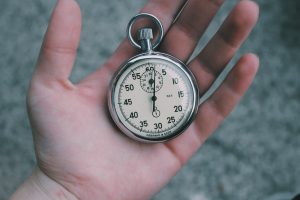
During a meal, your brain can take up to 20 minutes to process and signal you to say that you are full and may stop eating after you are physically satiated1 (Steen, Huffington Post).
This time varies across the population but it remains a fact that there is a slight delay by the time you understand that you are full and you actually are full.
If you are on a diet or trying to lose weight, overeating for those 20 minutes can make all the difference in the world.
But don’t worry! You can get around this by eating a bit slower. Take time to enjoy and chew your food properly. The enjoying part will help you have a religious experience during your meals and the chewing will help you with digestion.
-
Increase Your Resting Energy Expenditure

About 60% to 75% of the calories you burn each day is accounted for by resting energy expenditure2 (Harvard Health Publishing). This is basically the energy you burn at rest. Resting energy expenditure is the result of your basal metabolic rate.
Building lean muscle mass, eating enough calories, aerobic exercises etc. can boost your metabolic rate, thereby, increasing your resting energy expenditure. Even small, incremental amounts of energy expenditure, like standing up instead of sitting down, can add up.
To know more about resting energy expenditure, you can read our full article.
-
Recharge Yourself With Healthy Food
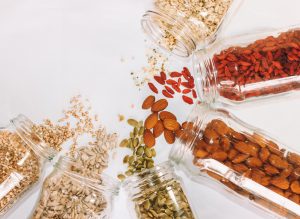
We will all admit to times when we don’t feel like ourselves. At that time, we may be surprised at the intensity of the temptation to try something (anything) different than our Diet Plan. This kind of dissociation is true regardless of whether we are following a healthy or unhealthy lifestyle.
Planning in advance for such potential contingency scenarios will help you have a Plan-B ready at hand which will help cater to your “dark side”. At the same time, it will help achieve your goals on weight loss or, at the least, get you on “damage control” mode.
If you are on a diet, then chances are that you will experience food cravings. Instead of resorting to unhealthy/oily/sugary food items, use healthy alternatives such as nuts (cashews, almonds, walnuts), fruits etc.
Studies45 (Mattes et al., 2008) have proven that nuts are useful to enhance palatability and nutrient quality without posing a threat for weight gain.
Fruits are another healthy option. While they may contain some sugar, they are high in fibre content and have numerous other properties that promote good health46 (Ford & Mokdad, 2001).
-
Replace Refined Carbs With Whole-grained Foods
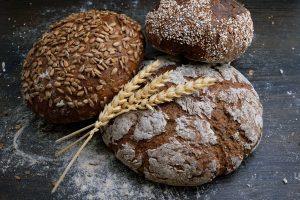
Refined carbohydrate foods are often high in calories and contain solid fats and added sugars. Food items like Pizza dough, Hamburger, Pasta, Pancakes, Waffles, and Cakes etc. contain refined carbs.
There are two types of carbs – “Whole” and “Refined”.
Whole carbs are natural and will have its inherent fibre content. Examples of whole carbs include oatmeal, vegetables, whole fruit, legumes, potatoes and whole grains.
Refined carbs are processed and devoid of its natural fibre. Examples of processed carbs include white pasta, sugar-sweetened drinks, pastries, cakes, baked items, etc.
If you replace refined carbohydrate foods with whole grained foods, it can go a long way towards your weight loss plans. Just check the Nutrition Facts Label to see if they use “enriched flour”. If they do, it contains refined carbs47 (Malia & Fogoros, Very Well Fit).
-
Reduce Intake of Added Sugar

Added sugars are carbohydrates/caloric sweeteners that have no nutritional value and work as “empty calories”. This means that you are consuming an additional load of calories. This will contribute to nothing other than to make you fat and, in the long run, disease-prone.
They are mainly found in sweetened beverages. So avoid bottled sugary drinks and sweetened beverages at any cost if you are serious about weight loss.
There is just too much evidence4-11 that suggests that you put your health in jeopardy every time you breach this rule. So be on your guard.
-
Eat More Vegetables And Fruits
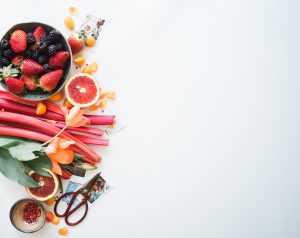
Eating more vegetables and fruits can help you reduce weight.
However, this will depend on two factors:
One – You need to choose items like cauliflower, berries, soy, pears, apples, etc. which are associated with weight loss over starchier vegetables like potato, peas, lentils, corn, beans, etc. which are associated with weight gain.
Two – The fruits/vegetables you do opt for need to be a substitute for some other food options and not an addition12 (Harvard School of Public Health).
Studies13, 16 (Alissa, 2017; Joshipura et al., 2001) have shown that eating more fruits and vegetables have a positive effect on cardiovascular health.
It has also been associated with a reduced risk of cancer and all-cause mortality14, 15, 18-21.
Moreover, it has been found to reduce the risk of cholecystectomy in women17 (Tsai et al., 2006).
-
Start Your Day With Eggs
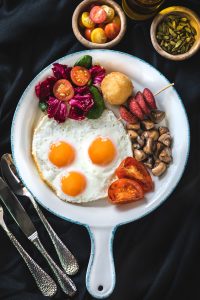
In short, eggs are low in calories, rich in protein and boosts metabolism.
Having a protein-rich breakfast like eggs will help you feel fuller. This feeling of satiety will help you consume less food throughout the day and stay on your diet to help you lose weight22, 26 (Plantenga, 2012; Soenen et al., 2013).
The metabolism-boosting feature of eggs is another advantage as it will help you increase your resting energy expenditure. This is called specific dynamic action, or more commonly the thermic effect of food23 (Wikipedia).
A 2016 study24 (Kral et al., 2016) has shown that consuming an egg-based breakfast significantly reduced short-term energy intake in children.
To cap it all off, eggs are very low in calories. Two hard-boiled eggs and a small cup of vegetables will have less than 300 calories only. But it can help you feel ‘full’ throughout the morning.
However, you need to keep in mind that cooking eggs with oils or butter increase caloric content significantly. One tablespoon of butter oil has about 112 calories25. So make sure to not go overboard with the cooking.
There are plenty of other reasons why you should be eating eggs to stay healthy. Read more further about the benefits of eggs.
-
Protein, Protein, Protein…

Some benefits that we discussed with eggs apply here too. The main difference is the bigger picture of what protein does for our bodies.
Our body needs protein on a daily basis. This is called Normal Protein Diet.
A 2013 study26 (Soenen et al., 2013) showed that a Normal Protein Diet can help in weight loss and weight maintenance whereas a High Protein Diet is required for additional preservation of resting energy expenditure and fat-free mass.
In simple words, it means that you can boost your weight-loss efforts by consuming foods rich in proteins.
As per DRI (Dietary Reference Intake), the Recommended Dietary Allowance for protein is 0.8 g per day. That would be around 56 g for a male and 46 g for a female over an average sedentary population.
You can get this27 (Wikipedia) from food items like meat, fish, legumes (pulses and lentils), nuts, milk, cheeses, eggs etc.
Protein content in food will also increase your feeling of satiety and helps you control energy intake for the rest of the day while increasing your resting energy expenditure at the same time.
Many studies28-34 have shown a positive correlation between higher protein intake and weight loss.
However, please do not confuse “higher” for insane amounts and it is recommended to consult a dietician to understand the intake for your customized needs.
Also, this should be done along with efforts to reduce other components like added sugar, high carbs, etc. to be effective as a diet-supplementing strategy.
-
Ingesting Cold Food
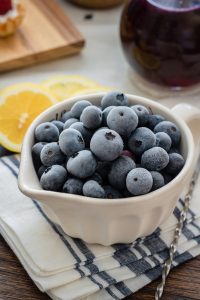
This is a method based on the simple principle of heat transfer. When you ingest cold food, the body must generate heat to not only digest but also to impart heat to the ingested food so as to achieve thermal equilibrium with the body temperature.
There is an extreme version of this. The Ice Diet35 (Weiner), as it is called, works by increasing the basal metabolic rate. When ingesting clinically significant amounts of ice, the body must burn energy to warm the ice to body temperature.
The ingestion of ice would also provide some level of satiety. This is a short-term method with potential repercussions to your teeth if you overdo this.
-
Intermittent Fasting
Weight loss-focused diet restrictions may be categorised broadly into 2 types based on the mode of calorie/energy restriction – Continuous and Intermittent.
Continuous calorie restriction diets work on a consistent reduction in calorie intake whereas intermittent calorie restrictions focus on fasting or sporadic reduction in calories on certain days. For those of you, who feel trapped while following the former, try out the latter.
Not that it is easier but the continuous urge resistance and discipline required for the former does not apply much for the latter. It doesn’t mean to say that you may binge-eat after the fasting window.
Within the latter, there is one-day fasts and time-restricted feeding. Both are effective in their own way and both have their own pros and cons. You can choose the style that suits you.
Some studies36-38 (Harris et al., 2018; Mattson et al., 2017) have shown that intermittent fasting helps to lose weight in overweight and obese individuals in the short term.
-
Meal Replacements
Meal replacements are basically products available in the market that can be used to substitute a meal and provide necessary nutritional value while considerably reducing calorie intake. At least some of you must have heard about terms like “protein shakes” which is a subset of this category.
Just keep in mind that this alone will not help you in long-term weight loss. Think about this as a tool to supplement your other efforts that involve lifestyle changes focused towards weight loss. This is called a Partial Meal Replacement plan.
A 2015 study40 (Raynor, 2015) that spanned over 1 year has shown that this method results in superior diet quality.
-
Cardio Exercises

This is the oldest method in the book. It is also the most effective.
There are those of you who are foodies and love to eat. You may feel mortified at the thought of having to restrict the passion of your life. Well, I have good news for you.
If you are willing to do intensive short bursts of cardio exercises regularly, you will burn off the additional calories and will not have to radically limit your passion for enjoying fine cuisine.
Nonetheless, this is a decision that is better made after consulting a physician to make sure that this is suitable for you.
Generally speaking, cardio exercises are a sure-fire way to lose weight and stay fit.
The problem associated with this is 2 fold:
- One is the lifestyle change required to force oneself to exercise every day;
- The other is the lack of understanding of how this is beneficial and can be tailor-made to be targeted so that the rewards are worth the effort that goes into this.
-
Leverage The Placebo Effect
This is a harmless psychological hack that will help you perceive things differently. Please do not think about this as “tricking your brain” as some people calls it.
Your brain is essentially yourself and trying to fool yourself is not a very motivating concept. Instead, just think about it as a change in how we perceive things. I would suggest the below:
- Using smaller plates – your perception of your regular portion would change and you will tend to eat less.
- No distractions while eating – Distractions like TV during meals will make you lose track of time and end up eating more without even knowing about it. Focus on eating when you are eating so that you don’t unintentionally stack your plate and overeat.
- Don’t deny yourself your favourites – The forbidden fruit is always more tempting and tastier. Just remember the Adam-Eve story and refrain from this mistake. We live only once. We might as well make ourselves happy through an occasional treat. Moderation (not denial) is the answer.
- Reduce going to buffets – Buffets (mainly paid ones) have a way of making you want to ensure that you are getting a VFM (Value for Money) deal. Needless to say, you tend to eat more than necessary.
- Reduce eating out – You tend to consume more portions (more than your usual amount) this way. You also end up consuming the unhealthy/fattening ingredients (like monosodium glutamate) used to enhance the taste.
-
Get Enough Sleep Everyday

Losing sleep leads to a slower metabolism and increases the risk of obesity and diabetes. This will eventually lead to weight gain as well.
So make sure to get the right amount of sleep necessary for your optimal functioning42 (Ross, 2016).
-
Drink Green Tea

Green tea has been proven by studies43 (Cisneros, 2017) to have many health benefits including weight loss.
However, some people (such as me) do not like green tea. My personal opinion is that it tastes bad. Nonetheless, it is hard to ignore the benefits of this drink. So I have a small hack to drink it without having to dwell on the taste. Those of you who dislike this drink might find this helpful:
- Take half a teacup of hot water and dip one or two bags of green tea in it. Let the tea extract seep into the hot water.
- Pour normal water into the glass and fill the other half of the cup. This will bring down the temperature considerably.
- Remove the tea bags and gulp the tea down in one sip.
- Drink a glass of water and wash your mouth.
To those of you who are tea-lovers, I apologize for using such a crude method. And that too, to drink a beverage that is probably considered a delicacy by many. You may, of course, ignore the tip.
This is mainly for those who avoid drinking this tea because they do not like the taste.
Better something than nothing, right?
-
The Journey Within

This may sound a bit philosophical, but the truth is that this is the most important tip within this article. If you are really serious about losing weight, you need to start by looking deep within you. You need to find what lifestyle habits or types of food items are contributing to your weight gain.
If you are reading this article until this point, chances are that you have been struggling with weight loss for some time now. This means that you must have already tried some of the orthodox methods of losing weight. So it would also help if you understand why they did not work out for you.
Not everyone is wired the same way. Therefore, even if a method is highly effective, you may find it very difficult to implement it depending on your genetics and tastes.
For example, if you have a sweet-tooth, totally avoiding such foods will take an immense amount of will power. And the fact is that since we have our highs and lows, it is almost impossible to have the emotional juice necessary to resist such temptations in the long run. Especially since will power is exhaustive and we may need to channel it to other important areas of our life.
So long story short, spending the time to understand your needs, habits, weaknesses, and eating patterns will help you best in the long run. It will also help you choose the weight loss methods that will suit you and help you make the kind of long-term lifestyle transitions necessary for sustained weight loss and maintenance.
-
Answer The Weight-Loss Questionnaire

The journey of a thousand miles begins with a single step. Similarly, the process of weight loss starts with your decision.
To get started and formulate a custom-made plan just for you, I have prepared a questionnaire. Truthfully answering this questionnaire will help you understand your peculiar tastes and tailor-make a weight loss plan that is unique to you.
I will release it soon in this article. Subscribe to get it immediately upon release.
I wish you all the very best and sincerely hope that this post helps you out with your objective.
References
- Steen, Juliette. “We Found Out If It Really Takes 20 Minutes To Feel Full.” Huffington Post, https://www.huffingtonpost.com.au/2016/11/09/we-found-out-if-it-really-takes-20-minutes-to-feel-full_a_21602736/. Accessed 16 Jan 2020.
- “Exercise and weight loss: the importance of resting energy expenditure.” January, 2015. Harvard Health Publishing, https://www.health.harvard.edu/diet-and-weight-loss/exercise-and-weight-loss-the-importance-of-resting-energy-expenditure. Accessed 16 Jan 2020.
- Richard D. Mattes, Penny M. Kris-Etherton, Gary D. Foster, Impact of Peanuts and Tree Nuts on Body Weight and Healthy Weight Loss in Adults, The Journal of Nutrition, Volume 138, Issue 9, September 2008, Pages 1741S–1745S, https://doi.org/10.1093/jn/138.9.1741S
- Schulze MB, Manson JE, Ludwig DS, et al. Sugar-Sweetened Beverages, Weight Gain, and Incidence of Type 2 Diabetes in Young and Middle-Aged Women. JAMA. 2004;292(8):927–934. doi:10.1001/jama.292.8.927
- Odegaard, A. O., Koh, W. P., Arakawa, K., Yu, M. C., & Pereira, M. A. (2010). Soft drink and juice consumption and risk of physician-diagnosed incident type 2 diabetes: the Singapore Chinese Health Study. American journal of epidemiology, 171(6), 701–708. doi:10.1093/aje/kwp452
- de Koning, L., Malik, V. S., Rimm, E. B., Willett, W. C., & Hu, F. B. (2011). Sugar-sweetened and artificially sweetened beverage consumption and risk of type 2 diabetes in men. The American journal of clinical nutrition, 93(6), 1321–1327. doi:10.3945/ajcn.110.007922
- Bray G. A. (2013). Energy and fructose from beverages sweetened with sugar or high-fructose corn syrup pose a health risk for some people. Advances in nutrition (Bethesda, Md.), 4(2), 220–225. doi:10.3945/an.112.002816
- Imamura, F., O’Connor, L., Ye, Z., Mursu, J., Hayashino, Y., Bhupathiraju, S. N., & Forouhi, N. G. (2015). Consumption of sugar sweetened beverages, artificially sweetened beverages, and fruit juice and incidence of type 2 diabetes: systematic review, meta-analysis, and estimation of population attributable fraction. BMJ (Clinical research ed.), 351, h3576. doi:10.1136/bmj.h3576
- Yang Q, Zhang Z, Gregg EW, Flanders WD, Merritt R, Hu FB. Added Sugar Intake and Cardiovascular Diseases Mortality Among US Adults. JAMA Intern Med. 2014;174(4):516–524. doi:10.1001/jamainternmed.2013.13563
- Brown, C., Dulloo, A. & Montani, J. Sugary drinks in the pathogenesis of obesity and cardiovascular diseases. Int J Obes 32, S28–S34 (2008) doi:10.1038/ijo.2008.204
- Rupérez AI, Mesana MI, Moreno LA. “Dietary sugars, metabolic effects and child health.” Current Opinion in Clinical Nutrition and Metabolic Care. 22(3):206–216, MAY 2019. doi: 10.1097/MCO.0000000000000553.
- “The Nutrition Source.” Harvard School of Public Health, https://www.hsph.harvard.edu/nutritionsource/what-should-you-eat/vegetables-and-fruits/. Accessed 16 Jan 2020.
- Alissa EM, Ferns GA. “Dietary fruits and vegetables and cardiovascular diseases risk.” Crit Rev Food Sci Nutr. 2017 Jun 13;57(9):1950-1962. doi: 10.1080/10408398.2015.1040487. Accessed 16 Jan 2020.
- Aune, D., Giovannucci, E., Boffetta, P., Fadnes, L. T., Keum, N., Norat, T., … Tonstad, S. (2017). Fruit and vegetable intake and the risk of cardiovascular disease, total cancer and all-cause mortality-a systematic review and dose-response meta-analysis of prospective studies. International journal of epidemiology, 46(3), 1029–1056. doi:10.1093/ije/dyw319
- Amiot-Carlin MJ. Fruit and vegetable consumption: what benefits, what risks? Rev Prat, 2019 Feb;69(2):139-142. https://www.ncbi.nlm.nih.gov/pubmed/30983210
- Joshipura KJ, Hu FB, Manson JE, et al. The Effect of Fruit and Vegetable Intake on Risk for Coronary Heart Disease. Ann Intern Med. 2001;134:1106–1114. doi: https://doi.org/10.7326/0003-4819-134-12-200106190-00010
- Tsai, Chung-Jyi et al. Fruit and Vegetable Consumption and Risk of Cholecystectomy in Women. The American Journal of Medicine, 2006, Volume 119, Issue 9, 760 – 767. https://www.ncbi.nlm.nih.gov/pubmed/16945611
- Van Duyn, Mary Ann S et al. Overview of the Health Benefits of Fruit and Vegetable Consumption for the Dietetics Professional. Journal of the Academy of Nutrition and Dietetics, Volume 100, Issue 12, 1511 – 1521. https://www.ncbi.nlm.nih.gov/pubmed/11138444
- Steinmetz, Kristia. et al. Vegetables, Fruit, and Cancer Prevention. Journal of the Academy of Nutrition and Dietetics, Volume 96, Issue 10, 1027 – 1039. https://www.ncbi.nlm.nih.gov/pubmed/8841165
- Block G, Patterson B, Subar A. Fruit, vegetables, and cancer prevention: a review of the epidemiological evidence. Nutr Cancer. 1992;18(1):1-29. https://www.ncbi.nlm.nih.gov/pubmed/1408943
- Liu R. H. (2013). Health-promoting components of fruits and vegetables in the diet. Advances in nutrition (Bethesda, Md.), 4(3), 384S–92S. doi:10.3945/an.112.003517.
- Westerterp-Plantenga, M., Lemmens, S., & Westerterp, K. (2012). Dietary protein – its role in satiety, energetics, weight loss and health. British Journal of Nutrition, 108(S2), S105-S112. doi:10.1017/S0007114512002589
- Wikipedia contributors. (2019, June 7). Specific dynamic action. In Wikipedia, The Free Encyclopedia. Retrieved 13:39, January 17, 2020, from https://en.wikipedia.org/w/index.php?title=Specific_dynamic_action&oldid=900690899
- Tanja V.E. Kral, Annika L. Bannon, Jesse Chittams, Reneé H. Moore. Comparison of the satiating properties of egg- versus cereal grain-based breakfasts for appetite and energy intake control in children. Volume 20, 2016, Pages 14-20, ISSN 1471-0153, https://doi.org/10.1016/j.eatbeh.2015.11.004.
- Calorie Control Council. https://caloriecontrol.org/healthy-weight-tool-kit/food-calorie-calculator/?
- Stijn Soenen, Eveline A. P. Martens, Ananda Hochstenbach-Waelen, Sofie G. T. Lemmens, Margriet S. Westerterp-Plantenga, Normal Protein Intake Is Required for Body Weight Loss and Weight Maintenance, and Elevated Protein Intake for Additional Preservation of Resting Energy Expenditure and Fat Free Mass, The Journal of Nutrition, Volume 143, Issue 5, May 2013, Pages 591–596, https://doi.org/10.3945/jn.112.167593
- Wikipedia contributors. (2020, January 16). Dietary Reference Intake. In Wikipedia, The Free Encyclopedia. Retrieved 13:48, January 17, 2020, from https://en.wikipedia.org/w/index.php?title=Dietary_Reference_Intake&oldid=936133834
- Minghua Tang, Cheryl L.H. Armstrong, Heather J. Leidy, Wayne W. Campbell. Normal vs. high‐protein weight loss diets in men: Effects on body composition and indices of metabolic syndrome. Volume21, Issue3, March 2013, Pages E204-E210. https://doi.org/10.1002/oby.20078
- Astrup A. Dietary approaches to reducing body weight. Baillieres Best Pract Res Clin Endocrinol Metab. 1999 Apr;13(1):109-20. https://www.ncbi.nlm.nih.gov/pubmed/10932679
- Drummen, M., Tischmann, L., Gatta-Cherifi, B., Adam, T., & Westerterp-Plantenga, M. (2018). Dietary Protein and Energy Balance in Relation to Obesity and Co-morbidities. Frontiers in endocrinology, 9, 443. doi:10.3389/fendo.2018.00443
- Clamp, L. D., Hume, D. J., Lambert, E. V., & Kroff, J. (2018). Successful and unsuccessful weight-loss maintainers: strategies to counteract metabolic compensation following weight loss. Journal of nutritional science, 7, e20. doi:10.1017/jns.2018.11
- Soenen S, Bonomi AG, Lemmens SG, Scholte J, Thijssen MA, van Berkum F, Westerterp-Plantenga MS. Relatively high-protein or ‘low-carb’ energy-restricted diets for body weight loss and body weight maintenance? Physiol Behav. 2012 Oct 10;107(3):374-80. doi: 10.1016/j.physbeh.2012.08.004. Epub 2012 Aug 19.
- Westerterp-Plantenga MS, Nieuwenhuizen A, Tomé D, Soenen S, Westerterp KR. Dietary protein, weight loss, and weight maintenance. Annu Rev Nutr. 2009;29:21-41. doi: 10.1146/annurev-nutr-080508-141056. https://www.ncbi.nlm.nih.gov/pubmed/19400750
- Brehm BJ, D’Alessio DA. Benefits of high-protein weight loss diets: enough evidence for practice? Current Opinion in Endocrinology, Diabetes and Obesity. 15(5):416–421. DOI: 10.1097/MED.0b013e328308dc13.
- Ice Diet. http://theicediet.com/Home_Page.html
- Harris L, Hamilton S, Azevedo LB, Olajide J, De Brún C, Waller G, Whittaker V, Sharp T, Lean M, Hankey C, Ells L. Intermittent fasting interventions for treatment of overweight and obesity in adults: a systematic review and meta-analysis. JBI Database of Systematic Reviews and Implementation Reports. 16(2):507–547, Feb 2018. DOI: 10.11124/JBISRIR-2016-003248.
- Wikipedia contributors. (2020, January 16). Intermittent fasting. In Wikipedia, The Free Encyclopedia. Retrieved 19:28, January 17, 2020, from https://en.wikipedia.org/w/index.php?title=Intermittent_fasting&oldid=936025867
- Mattson, M. P., Longo, V. D., & Harvie, M. (2017). Impact of intermittent fasting on health and disease processes. Ageing research reviews, 39, 46–58. doi:10.1016/j.arr.2016.10.005
- Mattson, M. P., Longo, V. D., & Harvie, M. (2017). Impact of intermittent fasting on health and disease processes. Ageing research reviews, 39, 46–58. doi:10.1016/j.arr.2016.10.005
- Raynor, H. A., Anderson, A. M., Miller, G. D., Reeves, R., Delahanty, L. M., Vitolins, M. Z., … Look AHEAD Research Group (2015). Partial Meal Replacement Plan and Quality of the Diet at 1 Year: Action for Health in Diabetes (Look AHEAD) Trial. Journal of the Academy of Nutrition and Dietetics, 115(5), 731–742. doi:10.1016/j.jand.2014.11.003
- Ross, K. M., Graham Thomas, J., & Wing, R. R. (2016). Successful weight loss maintenance associated with morning chronotype and better sleep quality. Journal of behavioral medicine, 39(3), 465–471. doi:10.1007/s10865-015-9704-8
- Ross, K. M., Graham Thomas, J., & Wing, R. R. (2016). Successful weight loss maintenance associated with morning chronotype and better sleep quality. Journal of behavioral medicine, 39(3), 465–471. doi:10.1007/s10865-015-9704-8
- Vázquez Cisneros LC, López-Uriarte P, López-Espinoza A, Navarro Meza M, Espinoza-Gallardo AC, Guzmán Aburto MB. Effects of green tea and its epigallocatechin (EGCG) content on body weight and fat mass in humans: a systematic review. Nutr Hosp. 2017 Jun 5;34(3):731-737. doi: 10.20960/nh.753.
- Institute of Medicine (US) Standing Committee on the Scientific Evaluation of Dietary Reference Intakes and its Panel on Folate, Other B Vitamins, and Choline. Dietary Reference Intakes for Thiamin, Riboflavin, Niacin, Vitamin B6, Folate, Vitamin B12, Pantothenic Acid, Biotin, and Choline. Washington (DC): National Academies Press (US); 1998. 1, Introduction to Dietary Reference Intakes. Available from: https://www.ncbi.nlm.nih.gov/books/NBK114332/
- Richard D. Mattes, Penny M. Kris-Etherton, Gary D. Foster, Impact of Peanuts and Tree Nuts on Body Weight and Healthy Weight Loss in Adults, The Journal of Nutrition, Volume 138, Issue 9, September 2008, Pages 1741S–1745S, https://doi.org/10.1093/jn/138.9.1741S
- Earl S. Ford, Ali H. Mokdad. Fruit and Vegetable Consumption and Diabetes Mellitus Incidence among U.S. Adults. Preventive Medicine, Volume 32, Issue 1, 2001, Pages 33-39. https://doi.org/10.1006/pmed.2000.0772.
- Frey Malia, Fogoros N.R. MD. “Refined Carbohydrates in Your Diet.” VeryWell Fit, https://www.verywellfit.com/what-are-refined-carbohydrates-3495552. Accessed 17 Jan 2020.
- Davy, B. M., Dennis, E. A., Dengo, A. L., Wilson, K. L., & Davy, K. P. (2008). Water consumption reduces energy intake at a breakfast meal in obese older adults. Journal of the American Dietetic Association, 108(7), 1236–1239. doi:10.1016/j.jada.2008.04.013
- Parretti HM, Aveyard P, Blannin A, Clifford SJ, Coleman SJ, Roalfe A, Daley AJ. Efficacy of water preloading before main meals as a strategy for weight loss in primary care patients with obesity: RCT. Obesity (Silver Spring). 2015 Sep;23(9):1785-91. doi: 10.1002/oby.21167. Epub 2015 Aug 3.
- Jeong J. N. (2018). Effect of Pre-meal Water Consumption on Energy Intake and Satiety in Non-obese Young Adults. Clinical nutrition research, 7(4), 291–296. doi:10.7762/cnr.2018.7.4.291.

Like!! Really appreciate you sharing this blog post.Really thank you! Keep writing.